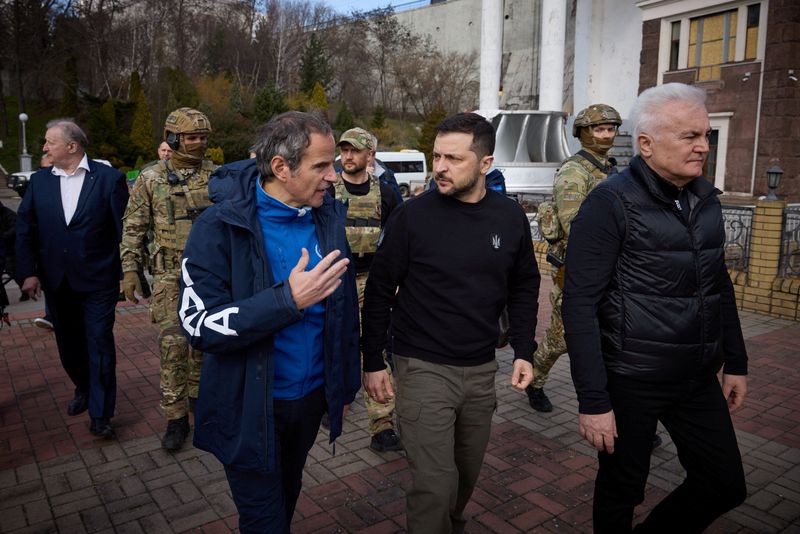By Dan Peleschuk
KYIV (Reuters) - Ukrainian President Volodymyr Zelenskiy told the head of the U.N. nuclear watchdog agency that safety at the Zaporizhzhia nuclear power station could not be guaranteed until Russian troops left the facility.
The president met Rafael Grossi, director general of the International Atomic Energy Agency, on Monday at the Dnipro hydroelectric power station - northeast of the Zaporizhzhia plant.
Russian forces took over the Zaporizhzhia plant, Europe's largest, in March 2022 in the early weeks of the war, and the Kremlin has shown no inclination to relinquish control over it. Russian officials say they want to connect the Zaporizhzhia plant to the Russian grid.
"Without an immediate withdrawal of Russian troops and staff from the Zaporizhzhia nuclear power station and adjacent areas, any initiatives on restoring nuclear safety and security are doomed to failure," the presidential website quoted Zelenskiy as saying.
Russia and Ukraine routinely accuse each other of shelling the facility and running the risk of a major accident. Fighting around the plant and worries its cooling systems could lose power have raised fears of a nuclear disaster.
Grossi said he and Zelenskiy had a "rich exchange" on the protection of the plant and its staff. A team of monitors from the U.N. agency has been stationed at the plant since September.
The IAEA chief has repeatedly called for a safety zone around Zaporizhzhia and is due to visit it again this week. Grossi has tried to negotiate with both sides but said in January that brokering a deal was getting harder.
Zelenskiy told Grossi that staff at the Zaporizhzhia plant were under constant pressure from Russian occupying forces, who he said were failing to uphold safety rules and interfering in technological processes, his office said. Kyiv has accused Moscow of using the plant as a shield for troops and military hardware.
Zaporizhzhia is one of four regions that Moscow claimed to annex in September after referendums denounced internationally as shams. Russia views the plant as its territory, which Ukraine denies.
Russia has accused Ukraine of putting the safety of the plant at risk. Russia said last month the construction of protective structures for key facilities at the Zaporizhzhia plant were nearing completion.
In his nightly video address, Zelenskiy said his talks with Grossi focused on energy security including that of Ukraine's nuclear power stations, which he said Russia was using "for radiation blackmail of the world."
"Holding a nuclear power station hostage for more than a year - this is surely the worst thing that has ever happened in the history of European or worldwide nuclear power," Zelenskiy said.
The Ukrainian president also met troops in southeastern Ukraine during a tour of the Zaporizhzhia region, his third trip to the front line in less than a week.
Zelenskiy said he had held the first on-the-road meeting of his military command in the central city of Dnipro, after visiting Marhanets and Nikopol, site of frontline positions.
A STUBBORN FRONT
Early on Monday, Ukraine shut the eastern town of Avdiivka to non-military personnel as Kyiv tried to break the back of Russia's flagging winter offensive before a counter-assault of its own.
A Ukrainian general said Kyiv was planning its next move after Moscow appeared to shift focus from the small city of Bakhmut, which Russia has failed to capture after several months of the war's bloodiest fighting, to Avdiivka farther south.
The Ukrainian Armed Forces General Staff said in a Monday evening update that Russian forces were still trying to storm Bakhmut and had shelled the city and surrounding towns.
Front lines in Ukraine have barely budged for more than four months despite a Russian winter offensive. The Ukrainian military aims to wear down Russian forces before mounting a counteroffensive.
Ukrainian ground forces commander Colonel General Oleksandr Syrskyi, who said last week the counterattack could come "very soon," visited frontline troops in the east and said his forces were still repelling Russian attacks on Bakhmut.
Defending the small city in the industrialised Donbas region was a military necessity, Syrskyi said, praising Ukrainian resilience in "extremely difficult conditions".
Last week, the Ukrainian military warned that Avdiivka, a smaller town 90 km (55 miles) farther south, could become a "second Bakhmut" as Russia turns its attention there.
Both towns have been reduced to rubble. Russian forces say they are fighting street by street.
NUCLEAR DEPLOYMENT PLAN
Since Putin's invasion to "demilitarise" Ukraine got bogged down in the autumn, he and other Russian officials have played up the prospect the war could escalate to involve nuclear weapons. On Saturday he said he had struck a deal to station tactical nuclear weapons in neighbouring Belarus.

Kyiv and its Western allies reacted angrily to the plan.
Ukraine called for a meeting of the U.N. Security Council, and Lithuania said it would call for new sanctions against Moscow and Minsk. EU policy chief Josep Borrell urged Belarus not to host the weapons and threatened more sanctions.